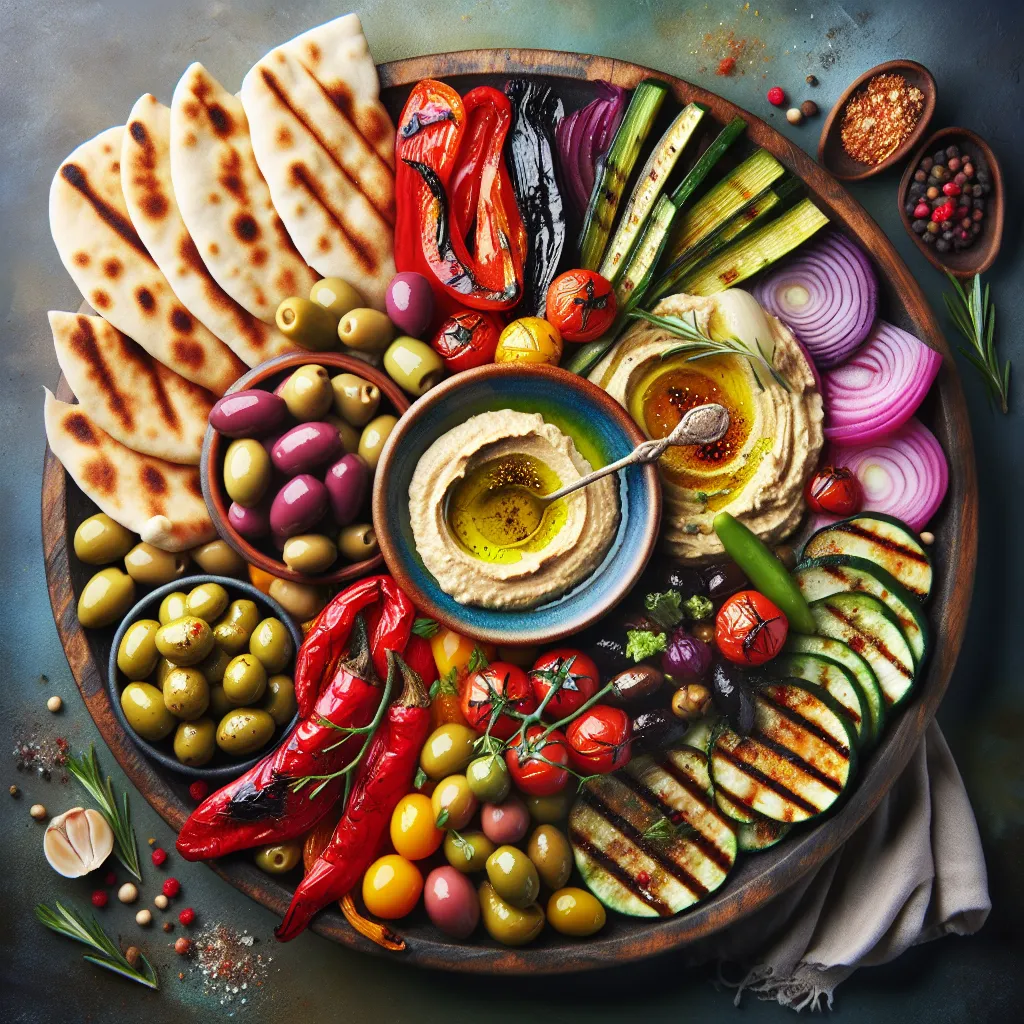A Culinary Journey through the Wonders of Mediterranean Flavors
Embark on a culinary journey through the wonders of Mediterranean flavors, and you will be transported to a world of savory delights that tantalize the taste buds and nourish the soul. The essence of Mediterranean cuisine lies in its rich history, diverse influences, and the use of fresh, high-quality ingredients that capture the essence of the region’s bountiful lands and seas.
From the sun-drenched coasts of Spain to the idyllic islands of Greece and the bustling markets of Morocco, each corner of the Mediterranean offers a unique array of flavors and aromas that reflect the rich tapestry of cultures that have shaped the region over centuries. The use of aromatic herbs such as oregano, thyme, and rosemary, along with the liberal use of olive oil, garlic, and citrus, forms the foundation of many Mediterranean dishes, imbuing them with a distinctive and irresistible allure.
Indulge in the robust flavors of dishes such as Spanish paella, Greek moussaka, Italian risotto, or Moroccan tagine, and you will discover a symphony of tastes that evoke the warmth of the Mediterranean sun and the intoxicating scents of its vibrant landscapes. Whether it’s the tangy zest of ripe tomatoes, the briny freshness of olives, or the earthy richness of grilled vegetables, every bite tells a story of tradition, passion, and the simple joys of sharing a meal with loved ones.
As you savor each mouthful, you’ll come to understand that Mediterranean cuisine is not just about food—it’s a celebration of life, a reflection of the region’s deep-rooted connection to the land, and a testament to the art of slow, mindful cooking. The Mediterranean diet, renowned for its health benefits and emphasis on wholesome, unprocessed ingredients, has captured the attention of chefs, nutritionists, and food enthusiasts worldwide, further cementing the timeless appeal of this culinary tradition.
So, whether you’re dining at a seaside taverna, strolling through a bustling food market, or recreating Mediterranean-inspired dishes in your own kitchen, take the time to savor the tapestry of flavors that this extraordinary region has to offer. From the piquant allure of feta cheese to the velvety sweetness of baklava, each bite is an invitation to embark on a sensory voyage that honors the rich tapestry of flavors woven into the heart of Mediterranean cuisine.
Unveiling the Rich History and Diverse Ingredients of Mediterranean Cuisine
Mediterranean cuisine is renowned for its rich history and diverse range of ingredients, offering a tapestry of flavors that captivate the palate. The culinary traditions of the Mediterranean region have been shaped by centuries of trade, conquests, and cultural exchange, resulting in a vibrant and varied gastronomic landscape.
One of the defining features of Mediterranean cuisine is the abundant use of fresh, locally sourced ingredients. Olive oil, an essential component of many Mediterranean dishes, embodies the sun-kissed essence of the region’s sprawling olive groves. From the tangy citrus fruits of the southern shores to the fragrant herbs that grace the hillsides, the Mediterranean terroir yields a bounty of flavors that form the foundation of its culinary identity.
Exploring the history of Mediterranean cuisine unveils a tapestry of cultural influences, reflecting the interplay of civilizations that have left their mark on the region. Phoenician traders introduced the coveted purple hue of Tyrian dye, which later found its way into the vibrant spectrum of Mediterranean spices. Greek and Roman conquests brought a wealth of culinary innovations, from the cultivation of vines for wine to the integration of exotic ingredients into local dishes.
Furthermore, the Moorish conquest of Spain left an indelible imprint on Mediterranean cuisine, introducing ingredients such as almonds, rice, and spices that forever altered the gastronomic landscape. The culinary journey through the Mediterranean becomes a captivating narrative of migration, conquest, and cultural exchange, as each wave of influence contributes to the rich tapestry of flavors that define the region’s cuisine.
In summary, the exploration of Mediterranean cuisine leads to a deeper appreciation of its rich history and the diverse array of ingredients that form the bedrock of its culinary heritage. From the sun-drenched shores to the rugged mountains, the Mediterranean region’s gastronomic delights offer a tantalizing glimpse into the interwoven stories of cultures, flavors, and traditions.
Mastering the Art of Savory Mediterranean Dishes: A Gastronomic Exploration
Mastering the art of savory Mediterranean dishes is a delightful gastronomic exploration that unveils a rich tapestry of flavors, textures, and aromas. The Mediterranean cuisine, renowned for its use of fresh herbs, robust olive oil, and aromatic spices, offers a harmonious balance of savory and fresh elements that captivate the senses.
From the sun-drenched coasts of Greece to the aromatic markets of Morocco, the Mediterranean region boasts a diverse array of culinary traditions that celebrate the bounty of the land and sea. Mastering the art of savory Mediterranean dishes involves a deep appreciation for the interplay of ingredients and the time-honored techniques that elevate simple preparations into extraordinary feasts.
Exploring the savory flavors of Mediterranean cuisine delights the palate with the earthy richness of roasted vegetables, the tangy brightness of fresh citrus, and the satisfying depth of slow-cooked meats. Whether indulging in the smoky allure of Spanish paella or savoring the herb-infused charm of Italian pesto, each dish reflects a deep connection to the land and its seasonal offerings.
Mastering the art of savory Mediterranean dishes requires an understanding of the essential ingredients that form the foundation of this celebrated cuisine. Olive oil, garlic, tomatoes, and aromatic herbs such as oregano, thyme, and rosemary are integral to creating the signature flavors of the Mediterranean. Pairing these ingredients with an assortment of olives, cheeses, and freshly caught seafood allows for an endless exploration of taste and texture.
In essence, the savory flavors of Mediterranean cuisine offer a gateway to a world of culinary mastery, where the simple act of combining the freshest ingredients with time-honored techniques creates an unforgettable dining experience. Whether preparing a classic Greek moussaka or a vibrant Moroccan tagine, the art of savory Mediterranean dishes invites both chefs and home cooks to embark on a journey of gastronomic discovery that celebrates the richness of this timeless culinary tradition.
Experiencing the Allure of Mediterranean Cuisine: From Sea to Plate
When it comes to experiencing the allure of Mediterranean cuisine, the journey begins with the region’s bountiful sea. The Mediterranean Sea not only provides a stunning backdrop for coastal dining, but also offers an abundance of fresh and flavorful seafood that forms the cornerstone of many Mediterranean dishes. From succulent grilled fish to rich and hearty seafood stews, the sea provides an array of ingredients that are central to the vibrant flavors of the Mediterranean diet.
Furthermore, the Mediterranean climate plays a significant role in shaping the culinary traditions of the region. The warm sun and fertile soil yield an array of fresh vegetables, aromatic herbs, and luscious fruits that add depth and complexity to Mediterranean dishes. In particular, the robust flavors of olives, tomatoes, eggplants, and peppers infuse Mediterranean cuisine with an unmistakable essence that captivates the senses.
Moreover, the art of preparing and savoring Mediterranean cuisine is deeply rooted in the region’s cultural heritage. From bustling marketplaces teeming with vibrant produce to cozy family-run eateries serving up generations-old recipes, the Mediterranean culinary experience is as much about the lively ambiance and convivial spirit as it is about the food itself.
Embarking on a journey through the savory flavors of Mediterranean cuisine allows one to explore a tapestry of tastes, textures, and aromas that celebrate the connection between land and sea, tradition and innovation. Whether indulging in the simplicity of a classic Greek salad or relishing the complex flavors of a Moroccan tagine, each bite tells a story of a culinary heritage shaped by centuries of history and influenced by a diverse tapestry of cultures.
So, whether you find yourself seated at a sun-kissed seaside taverna in Greece, a bustling seafood market in Spain, or a charming trattoria in Italy, embracing the allure of Mediterranean cuisine is an invitation to embark on a sensory-filled journey that encapsulates the essence of this enchanting region – from the sea to the plate.




